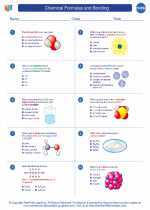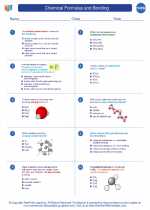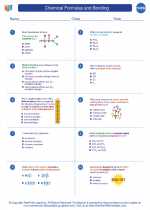Chemical Formulas and Bonding -> protons
Protons: Structure and Properties
Protons are subatomic particles that are found in the nucleus of an atom. They have a positive electric charge and are one of the three main building blocks of atoms, along with neutrons and electrons.
Structure of Protons
Protons are composed of three smaller particles called quarks. The specific combination of quarks within a proton gives it its positive charge and contributes to its overall properties.
Properties of Protons
- Electric Charge: Protons have a positive electric charge, which is equal in magnitude to the negative charge of electrons.
- Mass: The mass of a proton is approximately 1.67 x 10-27 kilograms.
- Stability: Protons are considered to be stable particles and are not subject to decay under normal conditions.
- Role in Atomic Structure: Protons determine the identity of an element. The number of protons in an atom's nucleus is known as the atomic number and is used to classify elements in the periodic table.
Study Guide: Understanding Protons
To better understand the concept of protons, here are some key points to focus on:
- Learn about the composition of protons, including the role of quarks in their structure.
- Understand the relationship between protons, neutrons, and electrons in the nucleus of an atom.
- Explore the concept of atomic number and its significance in determining the identity of an element.
- Study the properties of protons, including their mass, charge, and stability.
- Practice using the periodic table to identify elements based on their atomic number and the number of protons in their nuclei.
By mastering the fundamental properties and characteristics of protons, you can gain a deeper understanding of atomic structure and the behavior of elements in chemical reactions.
[Protons] Related Worksheets and Study Guides:
.◂Chemistry Worksheets and Study Guides High School. Chemical Formulas and Bonding
Worksheet/Answer key Chemical Formulas and Bonding
Chemical Formulas and Bonding  Worksheet/Answer key
Worksheet/Answer key Chemical Formulas and Bonding
Chemical Formulas and Bonding  Worksheet/Answer key
Worksheet/Answer key Chemical Formulas and Bonding
Chemical Formulas and Bonding 

 Worksheet/Answer key
Worksheet/Answer key
 Worksheet/Answer key
Worksheet/Answer key

The resources above cover the following skills:
PHYSICAL SCIENCE (NGSS)
Matter and Its Interactions
Students who demonstrate understanding can:
Plan and conduct an investigation to gather evidence to compare the structure of substances at the bulk scale to infer the strength of electrical forces between particles.